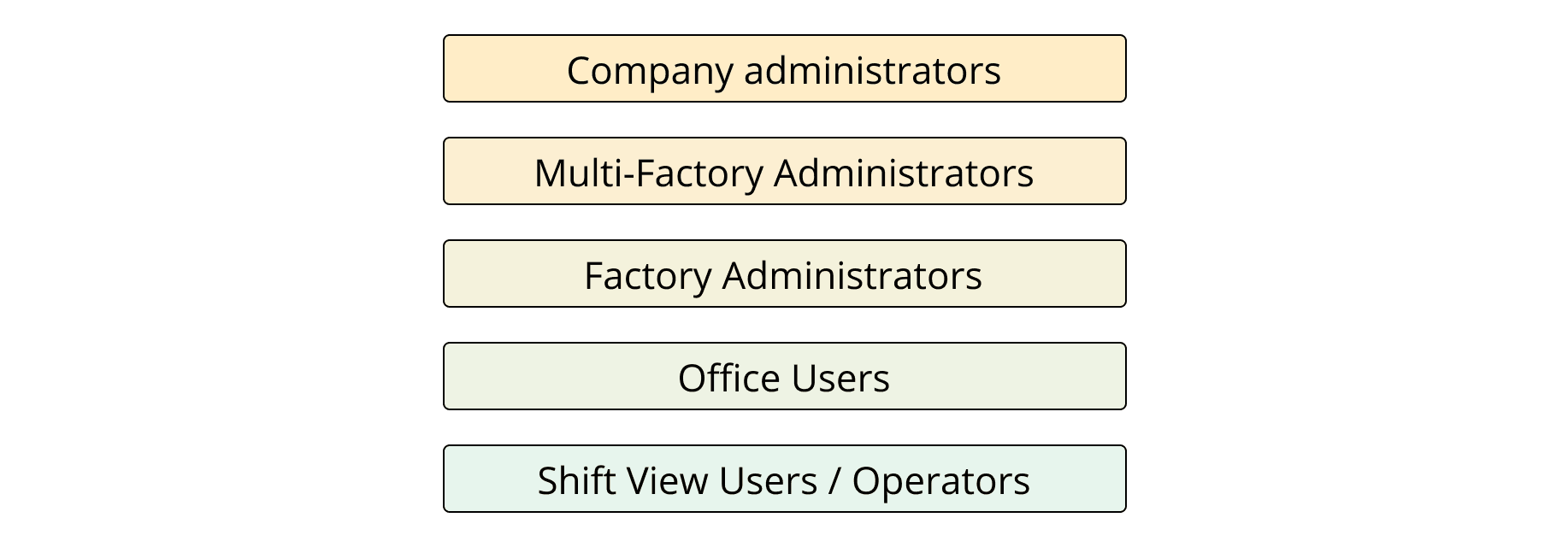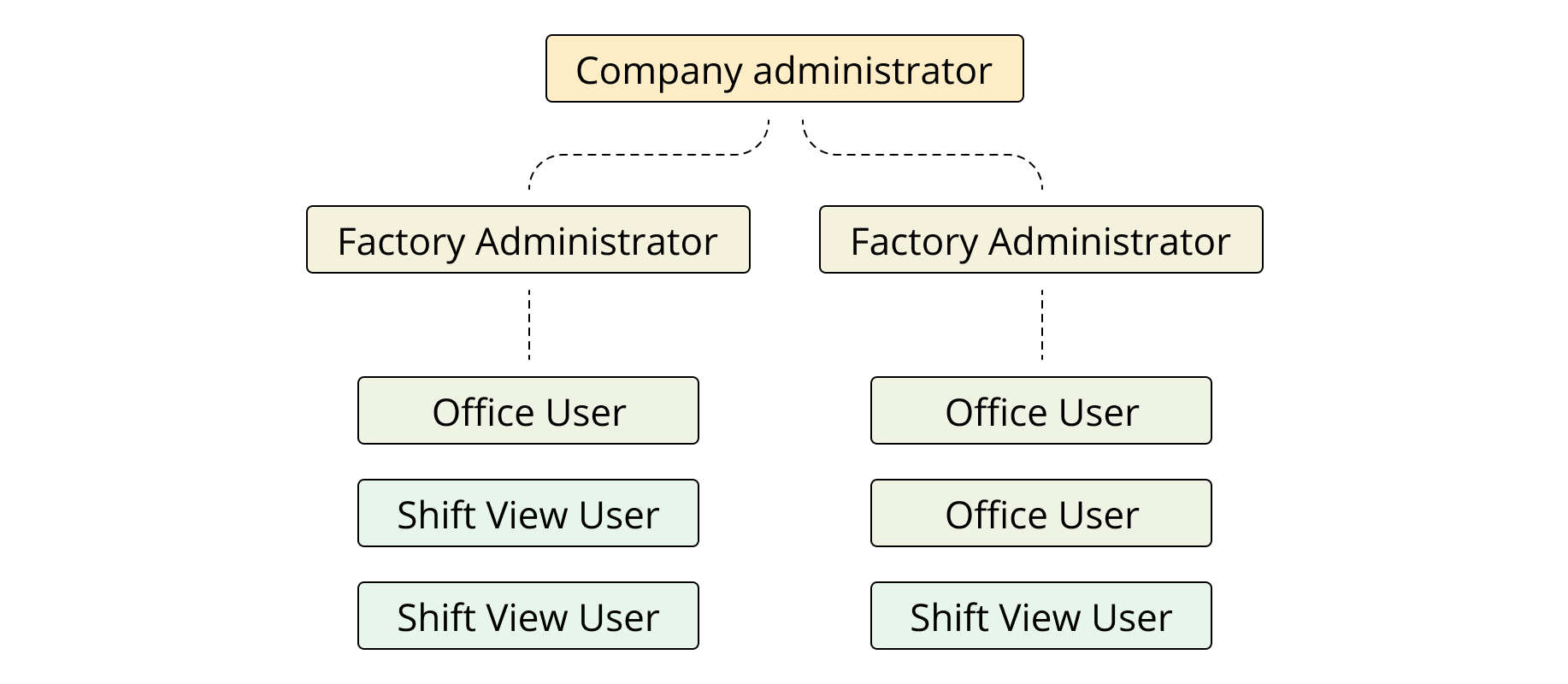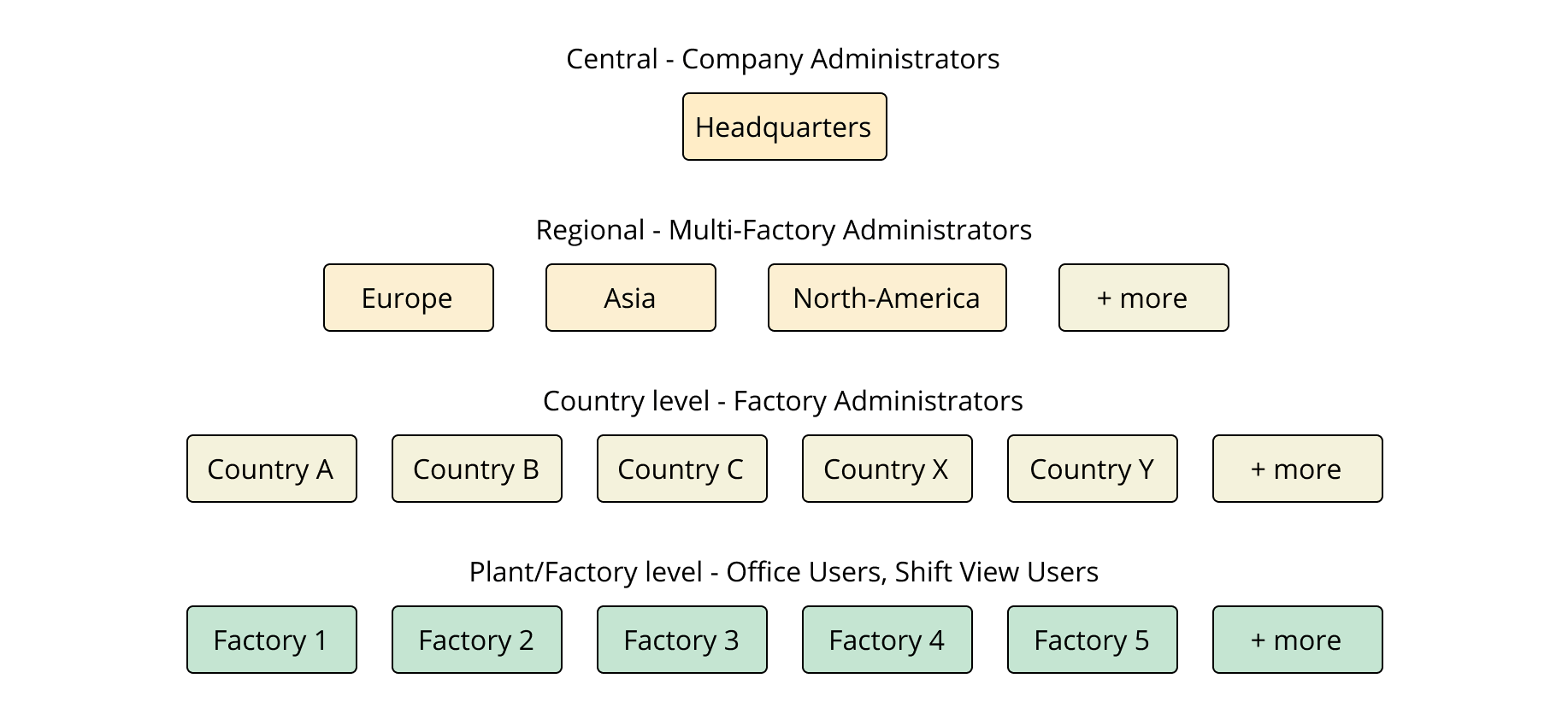User rights management plays a vital role in the security of production data for any type of manufacturing company. Correct management of rights and roles allows a company to control which production data a user can access to perform their role and the types of actions they can take on this data.
This article looks at how we have set up user rights and roles in Evocon’s OEE software.
How Evocon Supports Production Monitoring for SMEs and Global Corporations
Evocon user rights are managed in a way that provides the necessary flexibility for any organization to enable extraction of benefits for different user groups and stakeholders whilst also granting data integrity and security.
Different user rights and roles for different purposes
There are 4 different user roles in Evocon. Each of the roles has different access rights to the features available in Evocon and to the collected production data.
Company Administrator
A role that represents an Evocon superuser at the organization. Company Administrators can configure all settings in Evocon for the whole company. Typically this is a person(s) who is responsible for the production digitalization and digital transformation project in the company.
Factory Administrator
A role that has access to all modules in Evocon, including the Settings module. Factory Administrators are an additional user rights level that is meant for manufacturers that have multiple factories using Evocon. Whereas each local factory has a local administrator. Compared to Company Administrators, Factory Administrators have restrictions in adding and managing data (this depends on the company profile).
Note: One user can be a Factory Administrator in multiple factories, thus becoming a Multi-Factory Administrator.
Office User
This role has access to all Evocon features besides Settings. In other words, Office Users can work with all the features and production data in Evocon but do not have the right to make any adjustments in system configuration nor in the collected data. Typically used for analytics purposes.
Shift View User
This role in Evocon is for machine operators. Instead of each operator having their own account, you can create one Shift View User per machine. Operators just need to register themselves to work by selecting their name from a predefined list. This ensures better data security and integrity.
Note: in principle, it is possible to allow one Shift View User to access the data of multiple machines. This is common when one operator manages multiple machines.

Read & Write and Read-Only access to production data
To provide even more flexibility to manage user rights in an organization, you can determine whether a user has “read & write” or “read-only” rights to production data.
- Read & Write permission – Users can view and interact with the collected production data in Evocon.
- Read-Only permission – Users can only view the data for the selected production machines that they have read-only rights.
Time-restricted access
You can create further flexibility by enabling time-bound access to edit data. Evocon clients use this functionality to ensure that historical production data will not be changed by operators or office personnel intentionally or unintentionally. This feature is only available for Shift View Users and Office Users.
Combining user roles and user rights for multinational organizations
So far we have covered how Evocon supports different types of user roles as well as their access rights. Evocon’s architecture supports a further layer of flexibility that allows combining different user roles and their rights.
For example, one user can be a Factory Administrator in multiple factories, thus becoming a Multi-factory Administrator. Further modifications of user rights can give this user read-only access to other factories (e.g. to benchmark production performance).
This flexibility is necessary because of the nature of many manufacturing companies that are spread out between continents and countries or restricted by internal policies. Therefore, we have built the user rights system in a way that not only provides the necessary flexibility but also supports the natural processes of benchmarking and sharing of best practices between people, factories and regions. This is no small benefit as we have witnessed in multiple cases.
In the next chapter, we’ll look at some practical examples of how you can put Evocon’s user rights management to practice.
Start tracking OEE
Give your team the tools they need to start improving productivity and performance. Free for 30 days.
Evocon User Rights Management in Practice
To demonstrate how you can use Evocon’s user rights management, we’ll look at three common types of organizations among Evocon clients.
A manufacturing company with a single factory
The setup of user rights for a company that has one factory is very straight-forward and simple. It typically uses a combination of three roles (Company Administrator, Office User and Shift View User) with a small degree of customization of read-write and read-only access.

A manufacturing company with multiple factories
A company that uses Evocon to monitor production data and OEE in multiple factories can combine all of the 4 available roles to manage user rights.
Typically, companies with more than one factory have 1-2 Company Administrators, a Factory Administrator for each factory, and numerous Office and Shift View Users.

A manufacturing company with a global presence
Corporations that have production facilities in multiple continents and numerous countries have most to benefit from the flexibility that Evocon’s user rights management offers.
For example, let’s consider a manufacturing company that wants to monitor OEE and digitize their production in 3 continents, 10 countries and 30 factories.
- Central management of all production data will be done by Company Administrators.
- Regional management (continents) can be organized by creating Multi-Factory Administrators.
- Country or factory-based supervision is easily managed by creating as many Factory Administrators as needed.
- For local analytics, you can create users with office roles.
- Machine operators in different factories would have access to Evocon with different Shift View User.

We recommend reading how Yara uses Evocon for data standardization and how they pursued with a global implementation of Evocon in 22 countries.
Evocon – Built for Flexibility
As this article shows, we help make sure that the right people in your company have the right access to the production data they need.
So no matter, if you are a company with one factory or a company with locations around the world, Evocon’s user rights management supports your production monitoring and digital transformation.